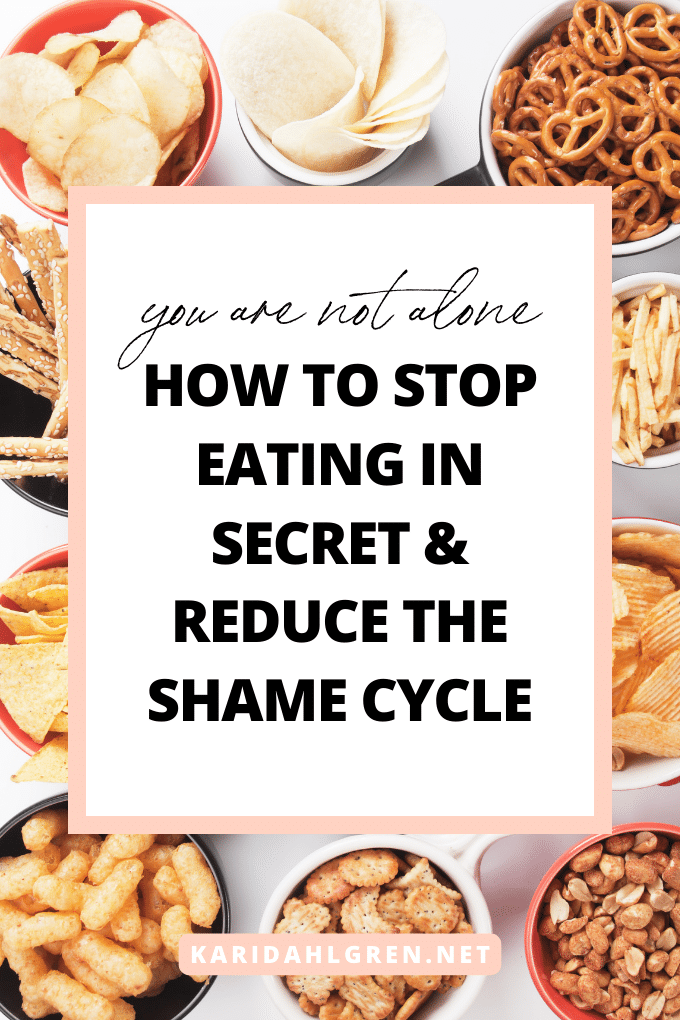
Secret eating, or the act of eating food away from others in a concealed and often shameful manner, is a behavior that many find difficult to discuss. It can be a vicious cycle as shame thrives in secrecy, and the more we hide “sneak eating” behaviors, the more shame we feel.
This article aims to shed light on this hidden issue, exploring the causes, symptoms, and strategies for overcoming secret eating. By understanding the emotional and psychological factors that contribute to secret eating, we can begin to recover from this behavior in a compassionate and holistic way.
Whether you’re dealing with feelings of shame, body dissatisfaction, or the pressure to maintain a perfect image, know that you’re not alone in this struggle. Together, we’ll explore practical steps and insights to help you break free from the cycle of secret eating and develop a healthier relationship with food.
Understanding Secret Eating
Secret eating involves consuming food in isolation or secrecy. It may or may not involve hiding or hoarding food with the intention of eating it in secret later. It also may or may not involve eating large amounts of food.
Secret eating can manifest as a standalone issue or as part of broader eating disorders such as Binge Eating Disorder (BED). In BED, secret eating is characterized by solitary eating due to embarrassment about the quantity of food consumed, highlighting the strong link between secret eating and feelings of shame and guilt.
Shame thrives in silence and secrecy. The harder we try to hide our eating patterns, the more shame we are likely to feel. This vicious cycle can perpetuate the behavior of eating in secret, making it challenging — but not impossible — to break free.
Signs & Symptoms of Secret Eating & “Sneak Eating”
There is nothing wrong with eating food alone or preferring to eat away from others. However, when eating in secret is accompanied by shame, embarrassment, or any of the following symptoms, it can indicate a potential issue.
Here are common signs and symptoms of secret eating:
- Eating in Secret: Of course, secret eating is characterized by consuming food away from others in a concealed manner. It can feel “sneaky,” and sometimes secret eating is referred to as “sneak eating.”
- Binge Eating: Binge eating involves episodes of eating large quantities of food in a short period, often accompanied by feeling out of control.[1] Secretiveness is not experienced by all individuals with binge eating disorder, but secret eating is a strong predictor of binge eating.[2] That said, eating episodes can be secretive even when they are not binges.
- Loss of Control Eating: This is characterized by feeling unable to control what or how much is being eaten, even if it’s not a binge episode. It reflects a broader issue of feeling powerless over one’s eating habits, such as compulsively eating in secret, which can be a significant source of anxiety and shame.
- Hoarding Food: Not all secret eating is accompanied by hiding and hoarding food; however, they can co-occur. Hoarding involves persistent difficulty discarding possessions, which can include food. In one study, hoarding behaviors were associated with binge eating, and problems with emotion-regulation played a role.[3]
- Weight Concerns: A preoccupation with body weight and shape is common, often leading to repeated dieting attempts. This constant worry about weight can exacerbate secret eating behaviors as individuals may feel trapped in a cycle of dieting and secretive overeating.
- Overvaluation of Body Shape: Placing excessive importance on body shape and weight is often linked to body dissatisfaction. This overemphasis can drive the shame that often motivates secret eating behaviors.
- Depression: Feelings of sadness, hopelessness, or worthlessness can be both a cause and a consequence of secret eating. The isolation and secrecy associated with this behavior can contribute to depressive symptoms, creating a vicious cycle that’s hard to break.
- Shame: Intense feelings of embarrassment and inadequacy associated with eating habits contribute to hiding food and eating in secret. The stigma surrounding eating and body image issues can make individuals feel like they need to hide their eating habits, further entrenching the behavior.
- Guilt: Persistent feelings of guilt after eating, particularly after episodes of binge or secret eating, are common. This guilt can reinforce the secretive nature of the behavior, as individuals may feel they’ve failed in their self-control or dietary goals.
- Early Childhood Experiences: In a study of 577 children and adolescents, 111 reported struggling with secret eating, indicating that these patterns are common and can begin early in life.[4] Another study found that parental control was not a predictor of the tendency to sneak, hide, or hoard food, suggesting that secret eating stems from something more personal.[5]
If you relate to any symptoms of secret eating, please know that you’re not alone. One of the hallmark characteristics of shame is the feeling that you’re the only one struggling with the shameful behavior — when you’re not the only one. Secret eating is a common experience that can be remedied with an appropriate, holistic approach.
What Causes the Tendency to Eat in Secret?
Before we dig into the steps on how to overcome patterns of hiding food and eating in secret, it’s important to fully understand what causes secret eating habits in the first place. While the symptoms of secret eating help us identify the pattern, navigating the root issues can help us truly understand what motivates “sneak eating.”
Here are common causes of hiding food and eating in secret:
Feeling Guilty for Eating “Bad Foods”
Feeling guilty after eating “bad foods” is a significant factor that can lead to sneak eating. This guilt often stems from the stigma and moralization of food, where certain foods are labeled as “good” or “bad,” creating a sense of shame around eating habits. When individuals internalize these labels, they may feel ashamed or guilty for consuming foods considered “bad” or indulgent. This guilt can be so overwhelming that it drives people to eat in secret, away from the potentially judgmental eyes of others.
Body Dissatisfaction
Low self-esteem and body dissatisfaction are deeply intertwined with sneak eating. When someone struggles with negative feelings about their body, they might turn to food for comfort, yet feel ashamed of this coping mechanism. This shame can lead to sneak eating, as the individual seeks to hide their eating habits from others to avoid judgment.
This cycle of eating in secret can exacerbate feelings of low self-esteem, creating a challenging and self-fulfilling feedback loop. The secrecy of sneak eating reinforces the belief that there’s something wrong with indulging in certain foods and can even perpetuate the development of “fear foods,” or intense anxiety around specific foods. This can deepen body dissatisfaction, as the person feels they’re failing to meet their own or society’s standards.
Feeling Insecure and Judged Around Food
When individuals feel scrutinized for their food choices or eating habits, they may start to eat in secret to avoid the discomfort of being judged. This insecurity can stem from societal pressures, comments from peers or family, or internalized beliefs about what is “acceptable” to eat.
As someone living in recovery from compulsive eating, I have certainly had moments of eating in secret, and for me it was motivated by the desire to avoid judgment from the people I lived with. I didn’t want to be seen eating a bag of chips late at night, so I would sneak it up to my room so that no one could “catch me” in the shameful act of eating stigmatized foods.
Perfectionism and Pressure to Perform
Perfectionism and the pressure to perform can significantly contribute to the development of secret eating behaviors. Perfectionism, characterized by setting excessively high standards for oneself, is a known risk factor for depression, anxiety, and eating disorders, all of which are associated with secret eating.[6]
A relentless pursuit of perfection often extends to one’s diet and body image, leading to an all-or-nothing mentality where any deviation from strict dietary rules is seen as a failure. In a society that places a heavy emphasis on performance and appearance, this pressure can be amplified.
Individuals may feel that they need to maintain a facade of perfect eating habits and an ideal body image, which can lead to sneak eating as a way to cope with the stress of these unrealistic expectations.
Seeking Control and Autonomy
Seeking control and autonomy is a fundamental human need, playing a vital role in our overall well-being.[7] It’s a positive aspect of our psyche that helps us navigate life’s challenges and assert our independence. However, when this need is threatened or unmet, it can manifest in unhealthy ways, such as through disordered eating behaviors.
Studies have shown that a fear of losing control and feelings of ineffectiveness are strongly correlated with disordered eating.[8] For some individuals, sneak eating becomes a way to assert control over their food choices and eating habits in a world where they may feel powerless in other areas of their lives. It can be a secretive act of rebellion or a means to maintain a sense of autonomy in their dietary decisions.
The Restrict-Binge Cycle
When dieting is involved, the restrict-binge cycle contains key insights into patterns of hiding food and eating in secret. When individuals restrict their food intake, their body perceives a threat to its energy resources, triggering natural survival mechanisms. This leads to hormonal changes that increase hunger signals and intensify cravings for high-calorie foods, often the very foods that are being restricted.[9]
Psychologically, the strict rules and forbidden nature of certain foods can amplify thoughts about food and the desire for “forbidden foods.”[10] In an attempt to cope with the uncomfortable emotions associated with breaking these self-imposed food rules, individuals may turn to sneak eating as a temporary escape or a way to numb their feelings. Unfortunately, this behavior only perpetuates the cycle of guilt, secrecy, and sneak eating.
How to Stop Hiding Food and Eating in Secret
Overcoming secret eating requires a blend of self-kindness and practical strategies. Because shame is both a motivator and symptom of “sneak eating,” it’s essential to embrace the recovery process with an abundance of compassion towards yourself.
Here are some tips to help you break free from the cycle of secret eating:
Increase Autonomy by Supporting Yourself with Professional Guidance
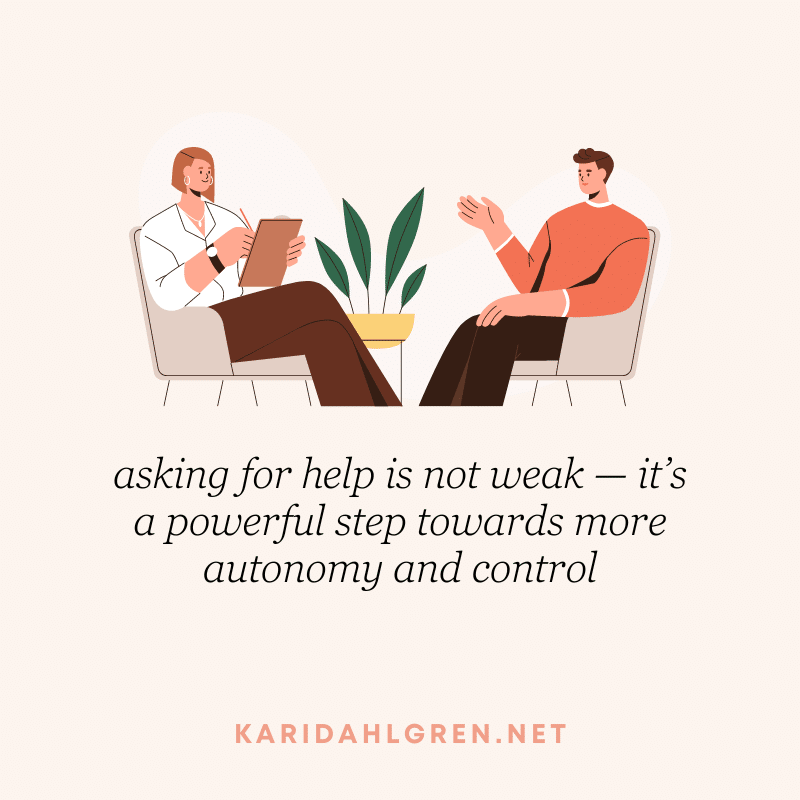
For many individuals struggling with sneak eating, the desire for autonomy and control can lead to a “do it yourself” attitude towards recovery. However, it’s important to recognize that seeking support from a professional can actually enhance your sense of autonomy and control, rather than diminish it. By working with a therapist, counselor, dietitian, or eating psychology coach like myself, you’re taking a proactive step towards overcoming sneak eating tendencies.
Each type of professional offers unique insights and strategies tailored to your individual needs. Therapists and counselors can help you explore the emotional and psychological aspects of sneak eating, while dietitians can provide guidance on balanced nutrition and eating habits. As an eating psychology coach, I focus on the relationship between your thoughts, emotions, and eating behaviors, helping you develop a healthier mindset around food.
Engaging with a professional doesn’t mean giving up control — it’s about gaining new tools and perspectives to empower your journey. Together, we can work towards breaking the cycle of sneak eating and building a more positive relationship with food and your body.
Identify Healthy Coping Mechanisms
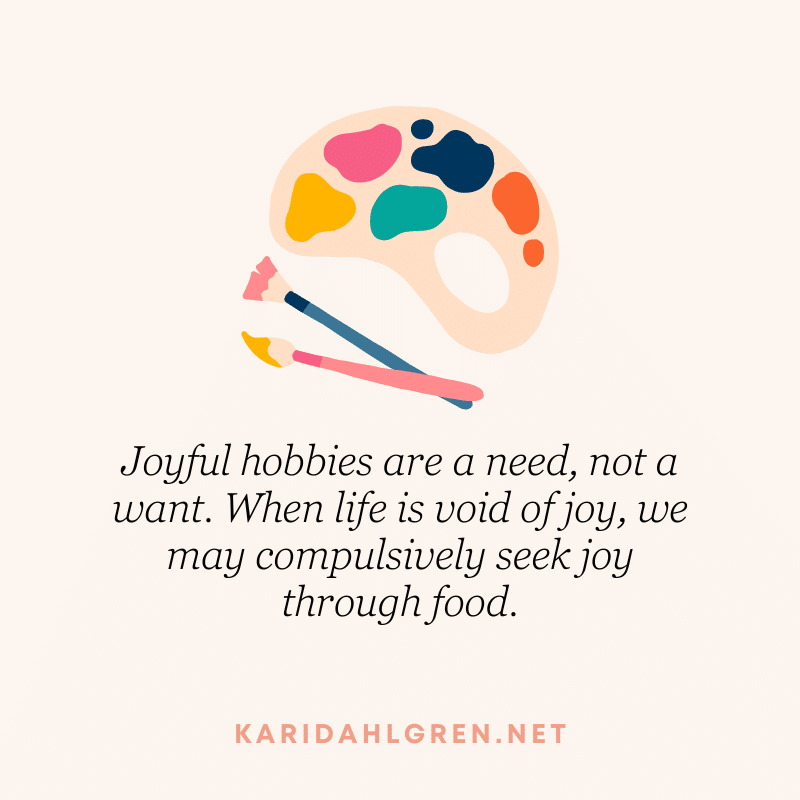
Next, identifying healthy coping mechanisms is a crucial step towards overcoming secret eating patterns. As we explore these strategies, remember that it’s okay to take small steps and I encourage you to celebrate your progress along the way. Each positive change you make brings you closer to a more open and balanced relationship with food.
Here are some strategies to address the urge to eat in secret:
- Mindful Eating: Engaging fully in your eating experience, also known as mindful eating, can heighten your awareness of emotions that might trigger the urge to hide food or eat in secret. Based on my own journey with compulsive eating, I understand that mindful eating can be challenging in the beginning. Therefore, I recommend aiming to eat mindfully as often as you can, but be kind to yourself and avoid inflicting guilt if you struggle to maintain this practice during tough times. It all improves with practice.
- Urge Surfing: In the moment that you feel the urge to eat in secret, pause and turn inward. Become curious about your emotions, even if for only just a couple minutes, and hold space for your emotions without resisting them. This practice can help build emotional awareness and, over time, it may help you build the capacity to overcome the urge. This is the premise behind my trademark Stop, Drop, & Feel®️ technique for stopping compulsive eating.
- Stress Management: The shame and guilt associated with “sneak eating” can trigger stress, and it can also be a symptom of stress. To help address the compulsion to hide food and eat in secret, incorporate relaxation techniques such as deep breathing, meditation, yoga, or gentle exercise into your day. Relaxation is often an underrated factor in recovering from compulsive eating.
- Structured Eating: I fully support the intention to only eat when hungry, and at the same time, I also fully support doing the kindest thing possible at every turn. Often, skipping meals because you aren’t hungry isn’t a kind option as it can lead to extreme hunger later on. Establishing regular mealtimes with balanced nutrition can help prevent extreme hunger and reduce the temptation to sneak eat.
- Hobby Development: When life is void of joy, it can increase the tendency to seek food for joy instead — also known as hedonic eating, or “eating for pleasure.” When secret eating is motivated by an attempt to gain pleasure, especially when it feels like the only pleasure you have, hobbies and creative pursuits are welcome and necessary.
As you explore these healthy ways of coping without using food, you’re taking important strides in overcoming secret eating. To continue building your toolbox, let’s dive into some advice from one of the most influential researchers in the field of shame and resilience: Brené Brown.
Utilize Brené Brown’s Shame Resilience Theory

Brené Brown is a renowned researcher who has spent over two decades studying courage, vulnerability, shame, and empathy. Her TED Talk on vulnerability is one of the most-watched of all time.
Drawing from Brené Brown’s work with shame resilience, here are more tips for overcoming secret eating tendencies:
- Develop “Critical Awareness”: Brené Brown points to critical awareness as a key antidote to shame. It involves challenging unrealistic expectations and societal pressures that contribute to feelings of shame. If you struggle with secret eating because you’re afraid of being judged, start to challenge the belief that your worth is tied to your eating habits or body image. My bestselling digital workbook, Why We Do the Things We Do, can be particularly helpful for this.
- Own Your Story: In Brené Brown’s renowned research on shame, she identified that “wrapping words” around shame can greatly diminish it. In other words, own your story by telling it. The key is to choose someone that you know will meet you with compassion and non-judgment. A trusted friend, family member, or healthcare professional are all great choices.
- Connecting with Others: By speaking about shame and being met with genuine empathy, you can experience a much-needed sense of validation and connection, reducing the power of shame. As shame diminishes, so does one of the biggest motivators for hiding food and eating in secret.
To inspire you to share your story with someone that you trust, here is one of my favorite quotes from Brené Brown:
“Owning our story can be hard but not nearly as difficult as spending our lives running from it. Embracing our vulnerabilities is risky but not nearly as dangerous as giving up on love and belonging and joy — the experiences that make us the most vulnerable. Only when we are brave enough to explore the darkness will we discover the infinite power of our light.”
Brené Brown
Recovering from Secret Eating
As we wrap up this exploration of secret eating, remember that overcoming this habit is a journey of self-discovery and healing. Embracing the principles of Brené Brown’s shame resilience theory, along with practical strategies for managing stress and emotions, can guide you toward a healthier relationship with food and yourself.
By recognizing the root causes of secret eating, challenging societal pressures, and nurturing your well-being, you can break free from the secrecy and shame. Your journey to recovery is a testament to your strength and resilience. You deserve to enjoy food openly and joyously, without fear or judgment. Let this be your first step towards embracing your story and reclaiming your power over your eating habits.

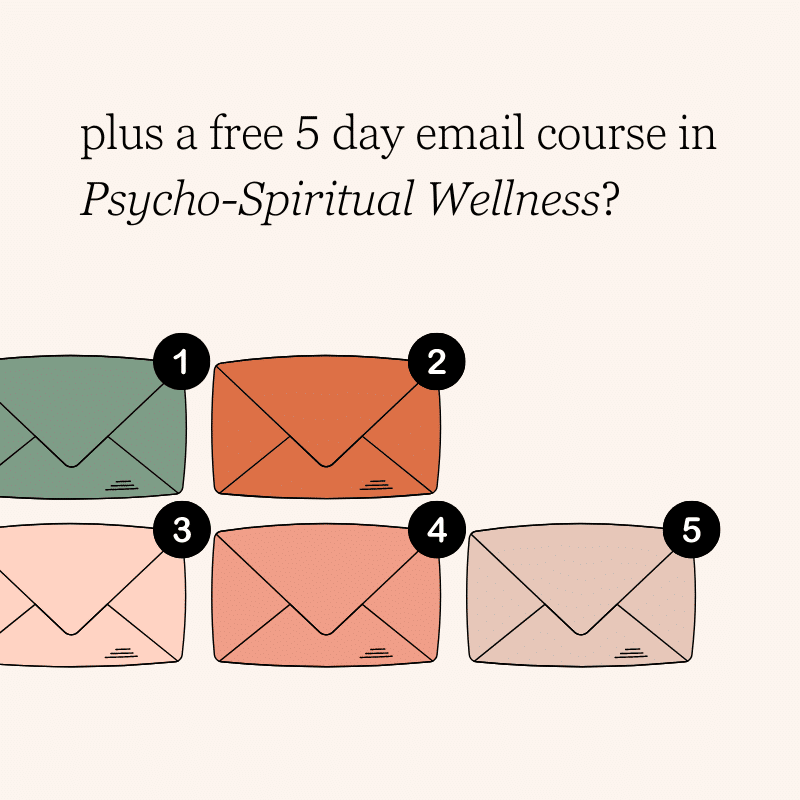
![best seller [cover of Why We Do the Things We Do]](https://karidahlgren-net.b-cdn.net/wp-content/uploads/2023/09/why-we-do-the-things-we-do-1.png)
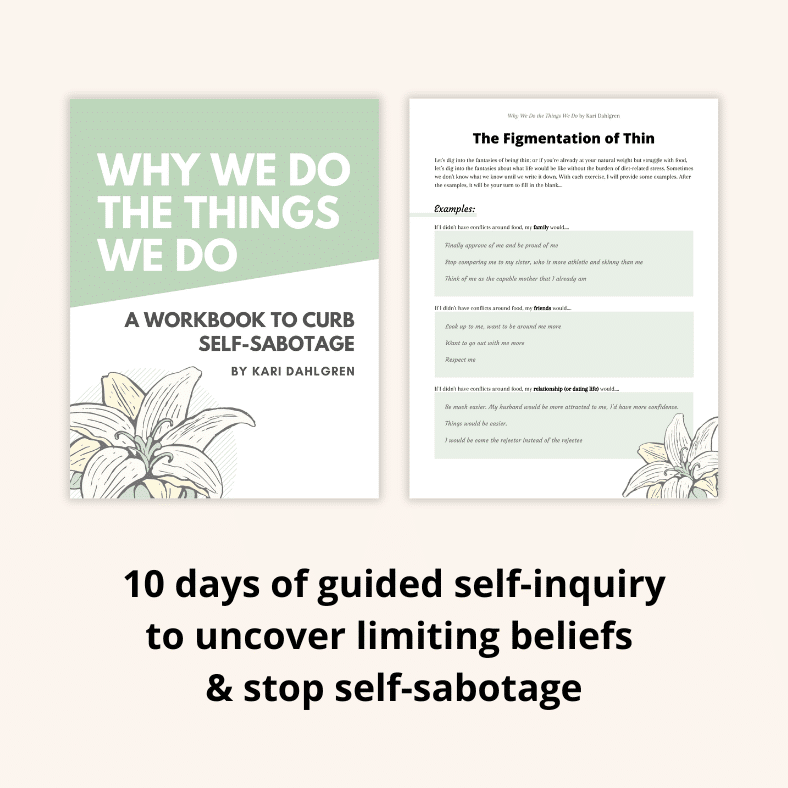
I found your article useful and accurate. I am making progress with my own issues of compulsive and sneak eating. Thank you for making your understandings available.
Thanks for letting me know this was helpful, Deborah! And by sharing your experience here, I think it helps others struggling with the same pattern feel less alone, and that is powerful 🙂
I had been posting about it on my Facebook page. I posted a link to your article here and some of the thoughts from it. Yes, I do believe it does help others to feel less alone when we are open about our less than perfect aspects of self.
I admire your vulnerability Deborah! Living from that space of courageous openness will no doubt lead to such beautiful places 🙂